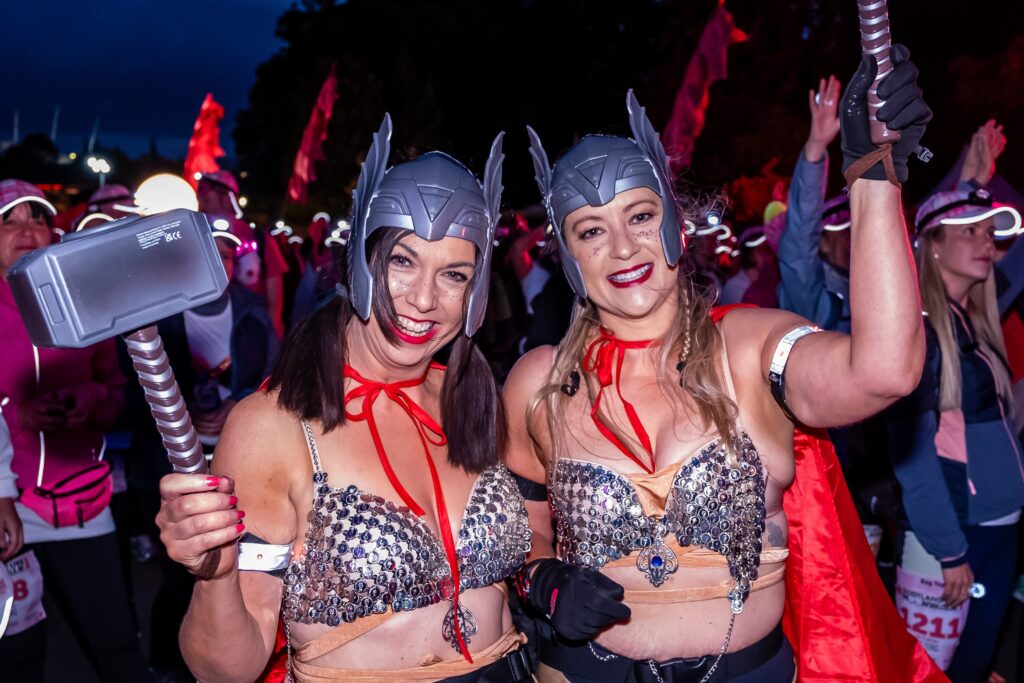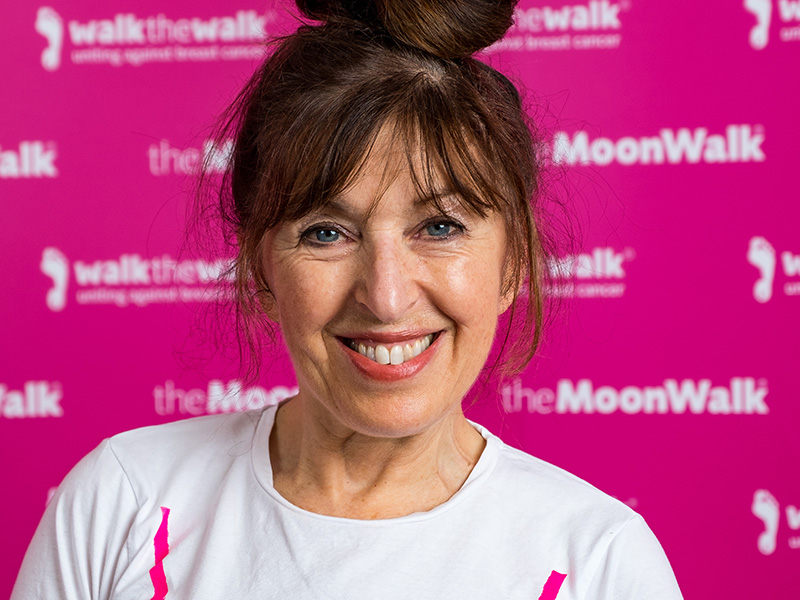Nina Barough CBE, founder and chief executive of breast cancer charity Walk the Walk highlights the charity’s legacy in Scotland
On Saturday 6 September, we will be holding our final MoonWalk Scotland in Edinburgh, before the event goes on tour to another city.
Over the last 19 years, this fun, colourful and joyous night-time fundraising event has lit up the streets of the capital once a year. Thousands of women, men and young people of all ages and abilities have taken on overnight walking challenges wearing decorated bras or brightly coloured bra t-shirts, raising more than £22 million.
The first MoonWalk London was held in 1998, followed by The MoonWalk Scotland in Edinburgh eight years later. At this time cancer was in a very different place. The word itself was feared – most people thought there was only one outcome following a cancer diagnosis.
At that time walking marathons in bras was hugely controversial! However, it really made a statement and a wave of MoonWalk followers came thick and fast. We were bringing fun to a subject which was fundamentally very serious, but often just not talked about.

It felt like we were throwing open the windows and doors, giving permission to talk about breast cancer, albeit connected to something that was fun.
Our iconic MoonWalk London had become very successful and I remember thinking how wonderful it would be to bring the event to Scotland. Before we took a step, I spoke to surgeons, oncologists and hospitals across the country involved with breast cancer care, to ask them what they needed and how they would use the money raised by a Scottish MoonWalk.
Our first MoonWalk Scotland was held in 2006. It was never the intention that it should stay in Edinburgh for more than a few years, but here we are, 19 years later! Throughout this time we have prioritised using the funds for projects which have the greatest impact.
I’m particularly proud of the ongoing legacy from the projects we’ve funded at the Western General Hospital in Edinburgh. When we first started working with the Western, the operating theatre was at the opposite end of the hospital to the breast cancer ward. Additionally, the mammography unit felt very communal, offering little chance of privacy for patients being told that they had breast cancer.
Funds raised by Walk the Walk have made a huge difference, paying for a new breast cancer ward and operating theatre located side-by-side, as well as renovating the mammography unit. The experience for breast cancer patients at the Western General has completely changed. So many people contact us to say how amazing it was when they were treated there. That’s a really wonderful legacy.
We’ve also been the principal funder of two Maggie’s Cancer Care Centres in Scotland – at the Beatson Hospital in Glasgow and the Forth Valley Royal Hospital in Larbert. We also gave a grant to Maggie’s Lanarkshire in Airdrie. These centres offer such a special service, where people diagnosed with cancer and their families can go for vital advice and support – it’s so important that everyone who needs this type of support has access to it.
I’m incredibly proud of the legacy from our multi-year project to fund the purchase of scalp coolers in hospitals across Scotland. These are incredible machines which help people undergoing certain types of chemotherapy for cancer to avoid losing their hair. While this type of treatment isn’t life-saving, it can make a huge difference to someone being treated for cancer.
Walk the Walk was instrumental in helping to remove the postcode lottery of this service in Scotland and across the UK, by funding scalp coolers in NHS Hospitals. One of our first scalp cooler grants was to a hospital in Stornoway, ensuring that cancer patients there could choose for themselves whether they would like to use a scalp cooler. This project was another example of Walk the Walk moving with the science – at the time, many people didn’t even know that scalp coolers existed.
As a charity, we’ve been a huge champion of 'integrated' care for cancer – for example counselling and holistic treatments alongside traditional medical care. This approach was felt to be rather left field when we started out as a charity but is now very much mainstream. During lockdown, much of this type of care had to move online – many cancer support charities didn’t have good online facilities having never previously needed them.
We were able to make a number of grants to fantastic cancer support charities across Scotland to help fund online sessions include counselling and exercise classes.
Thanks to funds raised by The MoonWalk Scotland, we’ve been able to make so many wonderful things happen. I’m so proud of every single one of our MoonWalkers, as well as the thousands of volunteers who have given up their time to help the event run smoothly on the night.
We’ve had such an amazing time in Edinburgh, but now it feels like the right time to take the event on tour. Of course there is a sadness to be leaving the Scottish capital, but I am incredibly proud of all we have achieved and the huge legacy we leave behind.
As we approach the final MoonWalk Scotland in Edinburgh on 6 September, I’d encourage everyone who has ever had the event on their bucket list to join us! It’s spectacular walking round Edinburgh at night, with so many of the iconic buildings lit up pink in honour of our walkers and volunteers. On 6 September, we have our usual overnight Half Moon (13.1 miles) or Full Moon (26.2 miles), plus for one year only, if the MoonWalk is a step too far, we have a daytime 5K Zoom Walk for all ages and abilities. All our walking challenges start and finish at Holyrood Park.
The whole day is going to be such a massive celebration of the last 19 years. I’ll probably shed a tear or two, but I’m also very excited about what the future holds.
Nina Barough CBE is founder and chief executive of breast cancer charity Walk the Walk.
For more information visit www.walkthewalk.org







